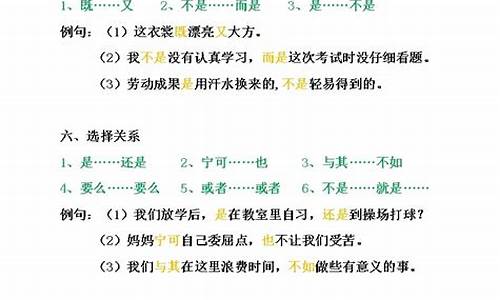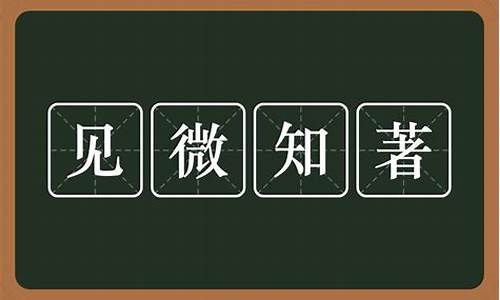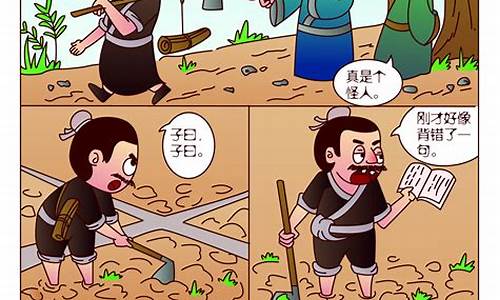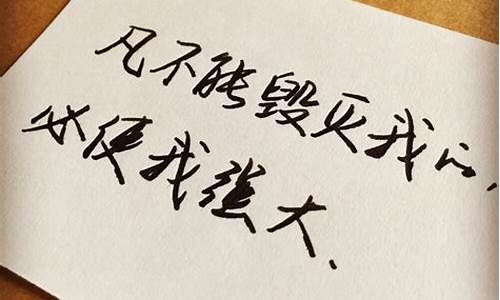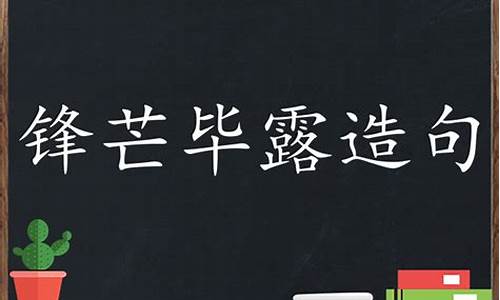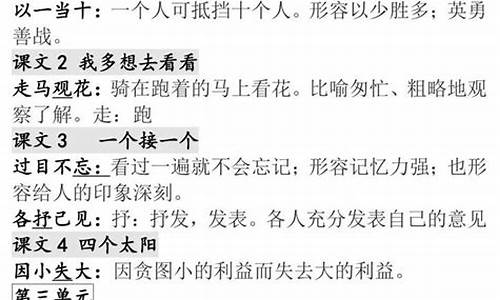邯郸成语有哪些doodle_邯郸成语有哪些成语
邯郸成语有哪些doodle的今日更新是一个不断变化的过程,它涉及到许多方面。今天,我将与大家分享关于邯郸成语有哪些doodle的最新动态,希望我的介绍能为有需要的朋友提供一些帮助。
1.急找成语小故事(简短)
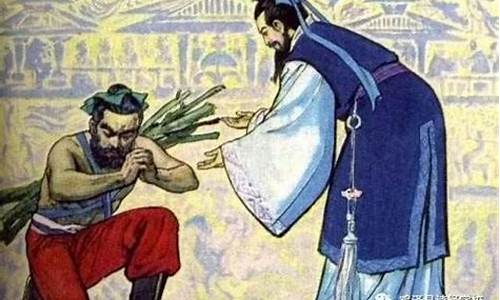
急找成语小故事(简短)
守株待兔
English
相传在战国时代宋国,有一个农民,日出而作,日入而息.遇到好年景,也不过刚刚吃饱穿暖;一遇灾荒,可就要忍饥挨饿了.他想改善生活,但他太懒,胆子又特小,干什么都是又懒又怕,总想碰到送上门来的意外之财。
奇迹终于发生了。深秋的一天,他正在田里耕地,周围有人在打猎。吆喝之声四处起伏,受惊的小野兽没命的奔跑。突然, 有一只兔子,不偏不倚,一头撞死在他田边的树根上。
当天,他美美地饱餐了一顿。
从此,他便不再种地。一天到晚,守着那神奇的树根,等着奇迹的出现。
成语“守株待兔”,比喻亡想不劳而得,或死守狭隘的经验,不知变通。
Staying by a Stump Waiting for More Hares To Come and Dash Themselves Against It
This story took place more than 2,000 years ago,in the Warring States period(475-221 B.C.).Tradition has it that in the State of Song at that time there was a man who was famous for staying by a stump waiting for more hares to come and dash themselves against it.
He was a yong farmer,and his family had been farmers for generations.Year after year and generation after generation, farmers used to sow in spring and harvest in autumn,beginning to work at sunrise and retiring at sunset.In good harvest years,they could only he enough food to eat and enough clothing to wear.If there was a famine due to crop failure,they had to go hungry.
This young farmer wanted to improve his life.But he was too lazy and too cowardly.Being lazy and cowardly over everything,he often dreamed of hing unexpected blessings.
A miracle took place at last. One day in late autumn,when he was ploughing in the field,two groups of people were hunting nearby.As shoutings were rising one after another,scared hares were running desperately.Suddenly,a blind hare dashed itself headlong against the stump of a dead tree in his field and died.
That day,he ate his fill.
From that day on,he no longer went in for farming again.From morning till night,he stayed by that miraculous stump,waiting for miracles to take place again.
This story comes from"The Five Vermin"in The Works of Han Feizi.Later generations often use the set phrase"staying by a stump waiting for more hares to come and dash themselves against it"to show grusting to chance and windfalls or dreaming to reap without sowing.It is also used to show adhering to narrow experiences and not being able to be flexible.
春秋时候,晋献公听信谗言,杀了太子申生,又派人捉拿申生的弟弟重耳。重耳闻讯,逃出了晋国,在外流忘十几年。
经过千幸万苦,重耳来到楚国。楚成王认为重耳日后必有大作为,就以国群之礼相迎,待他如上宾。
一天,楚王设宴招待重耳,两人饮洒叙话,气氛十分融洽。忽然楚王问重耳:“你若有一天回晋国当上国君,该怎么报答我呢?”重耳略一思索说:“美女待从、珍宝丝绸,大王您有的是,珍禽羽毛,象牙兽皮,更是楚地的盛产,晋国哪有什么珍奇物品献给大王呢?”楚王说:“公子过谦了。话虽然这么说,可总该对我有所表示吧?”重耳笑笑回答道:“要是托您的福。果真能回国当政的话,我愿与贵国友好。如有一天,晋楚国之间发生战争,我一定命令军队先退避三舍(一舍等于三十里),如果还不能得到您的原谅,我再与您交战。”
四年后,重耳真的回到晋国当了国君,就是历史上有名的晋文公。晋国在他的治理下日益强大。
公元前633年,楚国和晋国的军队在作战时相遇。晋文公为了实现他许下的诺言,下令军队后退九十里,驻扎在城濮。楚军见晋军后退,以为对方害怕了,马上追击。晋军利用楚军骄傲轻敌的弱点,集中兵力,大破楚军,取得了城濮之战的胜利。
故事出自《左传·僖公二十二年》。成语“退避三舍”比喻不与人相争或主动让步。
Retreating about Thirty Miles as Condition For Peace
During the Spring and Autumn Period (770-476 B.C.), Duke Xian of the State of Jin Killed the crown prince Sheng because he had heard slanders about Sheng and believed them. He also sent his men to arrest Chong Er, Shen Sheng and believed them. He also sent his men to arrest Chonh Er, Shen Sheng's brother. Hearing the news, Chong Er escaped from the state of Jin, remaining a fugitive for more than ten years.
After innumerable hardships, Chong Er arrived at the State of Chu at last. King Cheng of the State of Chu treated him with high respect as he would he treated the ruler of a state, believing that he would he a vright fuure.
One day, King Cheng of the State of Chu ge a banquet in honoudr of Chong Er. Suddenly, amid the harmonious atmosphere of drinking and talking, King Cheng of the State of Chu asked Chong Er. "How will you repay me when you return to the State of Jin and become its ruler one day?" After thinking for a moment, Chong Er said, "You he plenty of beauties and attendants as well as jewelry and silk cloth, and the state of Chu abounds in rare brides and animals. What treasure can the State of Jin boast hing to present to your majesty?" King Cheng of the State of Chu said, "You are too modest. Nevertheless, you still he to show your gratitude to me in one way or another, I presume?" Smiling, Chong Er answered, "If I should be fortunate enouge to return to the State of Jin and become its ruler, the State of Jin would be friendly to the State of Chu. If, one day, there should be a war between the two states, I would definitely order my troops to retreat three SHE (one SHE is equivalent to thirty LI. The LI is a Chinese unit of length equivalent to 1/2 kilometre. And, therefore, three SHE is about thirty miles.) as a condition for peace. If, under that condition, you were still not reconciled, I would he to fight with you."
Four years later, as might be expected, Chong Er returned to the State of Jin and became its ruler. He was none other than Duke Wen of the State of Jin famous in ancient Chinese history. Ruled by him, the State of Jin became increasingly powerful.
In the year 533 B.C., the Chu troops and the Jin troops confronted each other in a battle. Faithful to his promise, Duke Wen of the State of Jin ordered his troops to retreat about thirty miles. After retreating, the Jin troops were stationed at Chengpu. Seeing that the Jin troops were retreating, the Chu troops thought that the enemy troops were afraid, and began chasing them. Taking advantage of the Chu troops' arrogance and their talking the Jin troops lightly, the Jin troops concentrated their forces and inflicted a crushing defeat on the Chu troops, thus winning the victory of the battle of Chengpu.
This set phrase, "retreating about thirty miles as a condition for peace," is derived from the Chapter "The Twenty-second Year of Duke Xi" in ZuoZhuan, the famous commentary by Zuo Qiuming on The spring and Autumn Annals. The idea of this set phrase is to give way to somebody in order to oid a conflict.
枕戈待旦
English
西晋人祖逖和刘琨,都是性格开朗、仗义好侠的志士。年轻时不但文章写得好,而且都喜欢练武健身,决心报效祖国。当时,晋朝表面上还管辖着中原大地,但实际上已是内忧外患,风雨飘摇了。祖逖和刘琨一谈起国家局势,总是慷慨万分,常常聊到深夜。
一天,祖逖又和刘琨谈得十分兴奋,刘琨不知什么时候睡着了,祖逖却久久沉浸在谈话的兴奋之中,不能入睡。“喔,喔,喔--”荒原上的雄鸡叫了起来,祖逖一跃而起,踢醒了刘琨:“听,这雄鸡啼鸣多么振奋人心呀,快起来练剑吧!”于是,两人操起剑来,在高坡上对舞。从此,他俩每天清早听到头一声鸣叫,一定来到荒原上抖擞神练起剑来。
刘琨被祖逖的爱国热情深深感动,决心献身于祖。一次他给家人的信中写道:“在国家危难时刻,我经常‘枕戈待旦’(枕着兵器睡觉一直到天明),立志报国,常担心落在祖逖后边,不想他到底走到我的前头了!……”
故事出自《晋书·祖逖传》。“枕戈待旦”出自刘琨《与亲故书》,形象地写出了刘琨随时准备杀敌报国的决心。后来用作成语,形容时刻警惕敌人,准备作战。
Lying with one's Head Pillowed on a Spear,Waiting for Day to Break
In the Western Jin Dynasty there were two young men.One of them was Zu Ti and the other was Liu Kun.Both of them were men of ideals and integrity who were chivalrous and of a sanguine disposition.They not only wrote excellent articles but also were fond of practising martial arts to keep fit, in order to render meritorious service to the country.Both of them were chief clerks responsible for document administration in Luoyang.Although in earance the Jin Dynasty had jurisdiction of the Central Plains comprising the middle and lower reaches of the Haunch and threatened by foreign invasion.Zu Ti and Liu Kun often talked about the country's situation till late into the night,and each time they talking very excitedly again.Liu Kun fell asleep without knowing it,but Zu Ti was too excited to fall asleep." Cock-a-doodle-doo,"came the crow of rooster in the wasteland.Zu Ti jumped up and kicked Liu Kun awake:"Listen.How inspiring the rooster's crow is.Let's get up and practised on a slope.From then on,they kept practising sword playing vigorously and energetically in the wasteland every day when they heard the first crow in the morning.Deeply moved by Zu Ti's patriotic passion,Liu Kun was determined to devote himself to his homeland.Once he wrote to his family:"At the time when the country is in dire peril,I am resolved to dedicate myselt to the service of my country.I often fear that I might lag behind Zu Ti in rendering service to the country,and,in fact,I am behind him..." The words" sleep with my head pillowed on a spear,waiting for the day to break"vividly described Liu Kun's determination to dedicate himself to the service of the country and to fight the enemy at any time.Later,this set phrase is used to mean maintaining sharp vigilance and being ready to fight at any time. "不可救药
周朝有位卿士叫凡伯。凡伯不但有诗才,而且善于治理国事。后来,他在周厉王身边辅佐朝政。可是,周厉王飞横跋扈,枉法断事。奸臣则百般诌媚讨好。凡伯直言相劝,列数朝政弊端,奸臣却在周厉王耳边说他的坏话。周厉王对凡伯十分厌烦,从此,奸臣出入宫廷,不把凡伯放在眼里。凡伯十分愤慨,写了一首诗,后来收入《诗经》。诗中抨击奸臣说:“作恶多端,不可救药!”
“不可救药”:病重到不能用药救活。后比喻事物坏到无法挽救的地步。
乘风破浪
古代南北朝的时候,宋国有位将军姓宗名悫,他从小就很勇敢,也很有抱负。有一天,宗悫的叔父问他有什么志向,宗悫回答道:“愿乘长风,破万里浪。”意思是:我一定要突破一切障碍,勇往直前,干一番事业。宗悫经过勤学苦练,努力奋斗,终于成为一位能征善战的将军。
后来,人们就用“乘风破浪”来形容不怕困难,奋勇前进的精神
一衣带水
南北朝的时候,北方的北周和南方的陈国以长江为界。
北周的宰相杨坚,废了周静帝,自己当皇帝,建立了隋朝。
他决心要灭掉陈国,曾说:“我是全国老百姓的父母,难道能因为有一条像衣带那样窄的长江隔着,就看着南方百姓受苦而不拯救他们吗?
后来人们就用“一衣带水”来比喻只隔了一条狭窄水域的,靠得非常近的两地。
今天关于“邯郸成语有哪些doodle”的讲解就到这里了。希望大家能够更深入地了解这个主题,并从我的回答中找到需要的信息。如果您有任何问题或需要进一步的信息,请随时告诉我。
声明:本站所有文章资源内容,如无特殊说明或标注,均为采集网络资源。如若本站内容侵犯了原著者的合法权益,可联系本站删除。





